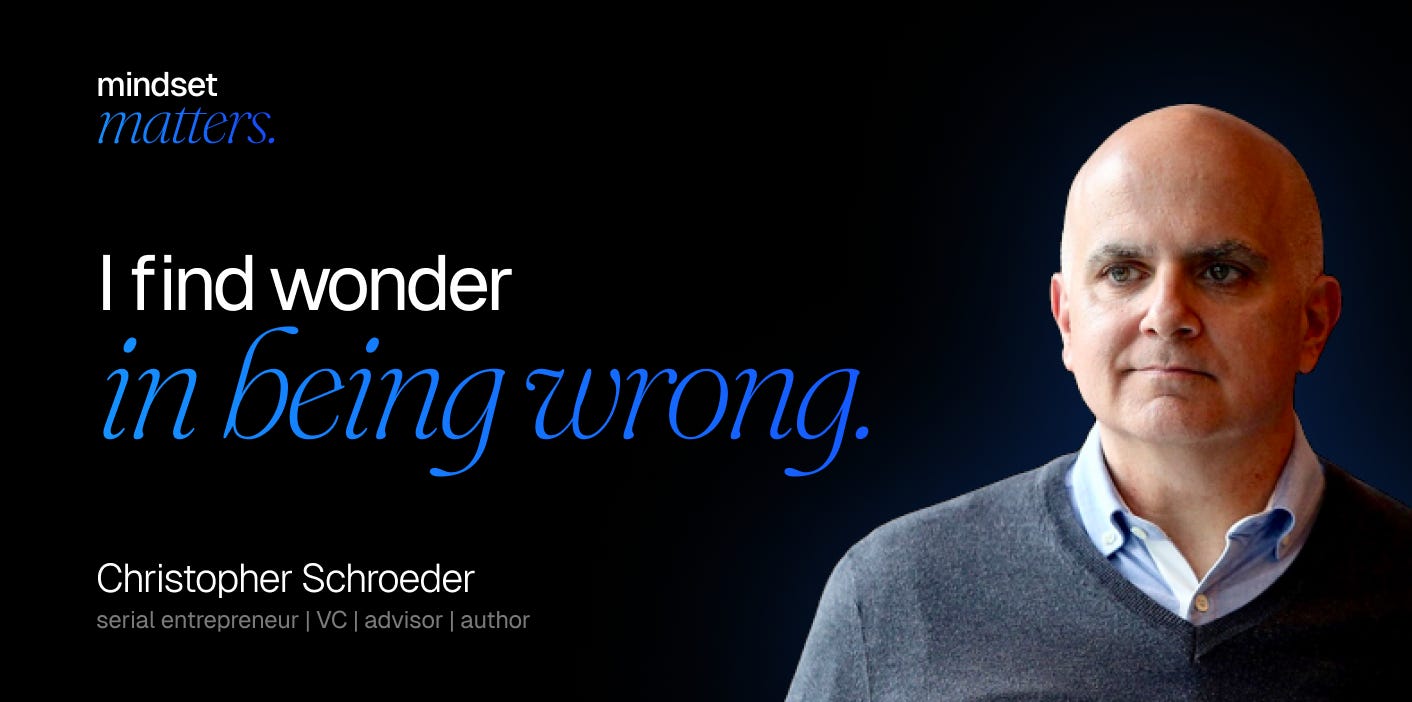I find wonder in being wrong: Christopher Schroeder | Mindset Matters
Hi there! I'm Dima, entrepreneur with investor background. Co-founder and former CEO @ Reface. Ukrainian. Scout @ a16z. Investor.
I launched the Mindset Matters to share thoughts and lessons I've gathered from conversations with serial entrepreneurs, top-notch VCs, builders, and doers I admire and respect. About more than just work.
Each issue explores how to balance life, find motivation and inspiration, and live fully from those who, in my view, have made it in forging their own path and maintaining healthy relationships with all life’s aspects.
Bi-weekly. Free. In your inbox and here, on Substack.
Today’s guest: Christopher Sсhroeder
Christopher Sсhroeder is a serial entrepreneur, co-founder of Legislate, HealthCentral, and Next Billion Ventures, venture investor, advisor, and author of “Startup Rising”. He currently is an active investor in and advisor to top US venture capital funds and over a dozen consumer-facing social/media startups.
I didn't know Christopher well before the large-scale invasion of Ukraine. He was one of the most active people in the a16z community, providing crucial support during the first weeks of the war for Ukrainian founders, particularly Reface.
This year, I received some invaluable advice from Christopher as I transitioned out of my CEO role:
Startups are not just about business models — they're about motivation and energy.
When choosing your next project, think of it as an investment.
If I handed you a few million dollars right now, where would you invest that money, your experience, your reputation, and your time?
I asked Christopher a few questions to gain deeper insight into his views on the meaning of life, its lessons, the structural norms people have recently developed, and happiness.
Here are his answers, unfiltered.
1. What's a common "meaningful life" advice that you just can't stand?
Any advice that, de facto, encourages narcissism.
2. If you could change one thing about our world (or your industry), what would it be?
Any structural, psychological, or political impediment to unleashing an individual's potential. So many of the other obvious ones [issues] we should say (like curing disease) may come with this.
3. What moments make you feel like your life is genuinely wonderful? (It can be something small or personal, not just big career stuff)
I find some wonder in most moments — but there is nothing like sharing a moment of wonder (and often laughs) with my kids.
I also have developed — and it takes conscious work — to find wonder in being wrong.
4. What's a big lesson life has taught you?
I don't know sh*t. Ask questions, really try to understand, realize you never can fully understand. Get on the ground, do it all again, and be humble.
5. Have you picked up any habits or routines recently that have made your days better?
I listen to books on every hike and every car moment.
That’s how I've increased my book consumption by 20%.
Has made me smarter and there are surprises galore.
6. What's one thing you wish someone had told you when you started your career?
I'm cheating with two:
"This too will pass" — both the good stuff and the hard stuff.
Related to that a professional tennis player once told me: "Play point to point. The score of the set matters but is kind of irrelevant. Win this point and you get the next point. Win that point and win a game. If you were behind 5 to 1, sometimes thus you wint 7-5."
7. Have you read, watched, or heard anything lately that really stuck with you? Why did it strike a chord?
Every.
I look for this in every encounter in fact. It is astounding how often there are many moments like this if I really listen and am aware of it.
8. Do you think any big organizations or systems (like schools or international groups) are going to change a lot soon?
I think large, top-down institutions do not begin to understand the ramifications of AI. Some will think it is merely an efficiency tool, others a threat to be banned, and some are just caught flat-footed.
The best have started experimenting with its potential, some amazingly so. But change with these capabilities behaviorally will likely come from smaller organizations and individuals. All of us will be surprised by something significant in this within the next three years.
That's all for today.
If some of Christopher's words resonated with you as much as they did with me, leave a comment or share this newsletter with someone who needs to hear it today.



